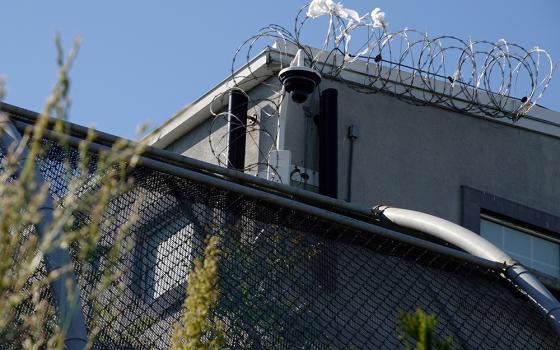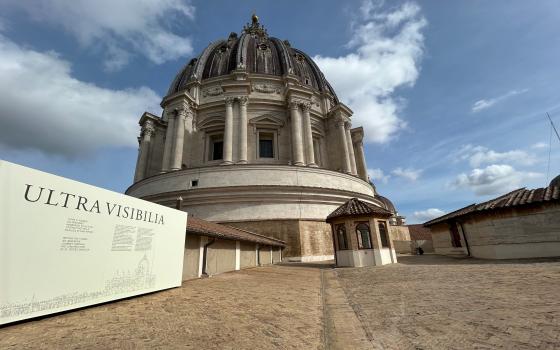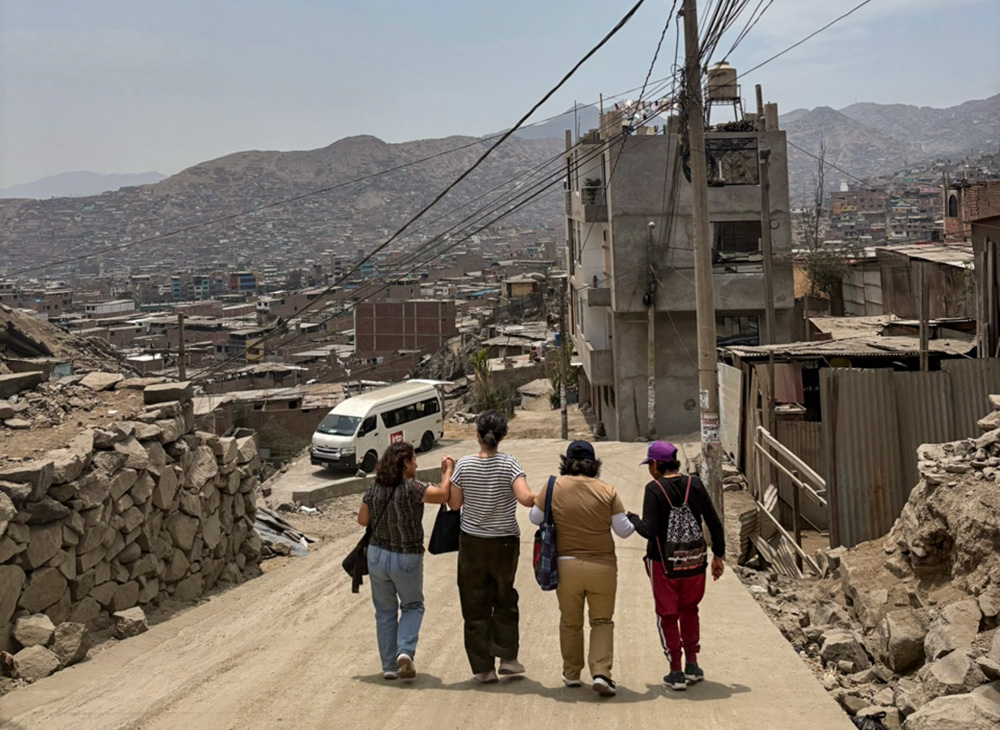
On the way back to the city from Lurigancho, Peru, the road was slippery and dry, but it was fun and safe when we held hands together firmly. Relying one another is such a wonderful practice of liberation theology among women. (Courtesy of Sophia Park)
The evenings in Lima, Peru, can feel surreal due to the light exuding from the countless stars that hang beyond the hill. I could see those stars as I approached the community where I would stay. I was somehow attracted to a specific beauty in this area and felt a deep desire to go there and see what it was.
In Lima, tiny houses were built back-to-back on the hill without insulation. That day was very hot, and I climbed up the hill to meet some brave women warriors who, with other women, were feeding the village in Lurigancho. A mixture of sisters, lay associates of the congregation of the Sisters of the Holy Names of Jesus and Mary, and other friends had also climbed up there.
The hill was steep, so it was hard to catch my breath, but people greeted me and my group of sisters, who were strangers to them, with kindness and warmth.
The site of my first visit was Sede San Juan de Lurigancho. A sign in front of the kitchen says Club Formándose para la Vida para Accompañar Mujeres, meaning the Club of Training for Life Through Accompanying Women. These centers over the hill existed in several places around Lurigancho. Religious women and lay associates help train women to be leaders.
In my mind, the kitchen had become a eucharistic table around which women break and share bread. Here, the woman in charge of this center was in the middle of cooking lunch. Some kids were eating lunch and doing homework together after school, and others stopped by to buy the cooked food.
One particular boy, José, who was 7 years old, told me that he was very good at math. I responded, "Yes, I noticed that you were brilliant!" And we both promised to study hard, more a promise I made to myself than to Jose.
Advertisement
The woman leader said she goes to the market every morning to buy the cheapest and freshest vegetables and, if possible, sometimes meat. The cost of the meal is three soles, less than US$1. Both the food and mood remind me of Isaiah 55:1:
You that have no money,
come, buy, and eat!
Come, buy wine and milk
without money and without price.
At that time, many were grieving the death of Peruvian Dominican Fr. Gustavo Gutiérrez, the founder of liberation theology. I, too, was baptized in liberation theology. So, for me, Lima and the people of Peru, who have struggled against poverty and violence, are sacred.
I found 21st-century liberation theology amid women's networks, creating communities with sweat and tears, fixing lunch for the villagers, and helping the needy. There, I sensed the unfolding mystery of God in liberation theology, incarnated and written in women's hands and hearts.
Women who cook for villagers are liberation theologians writing a new liberation theology. There was a strong sense of community there, and these women seemed fearless as long as they walked together.
Later, when we walked down to the city, the slope was dry and slippery. Thus, we decided to hold hands. I felt safe amid loud laughter as we held firmly onto one another. I simply could not contain my desire to honor these women theologians of the street.
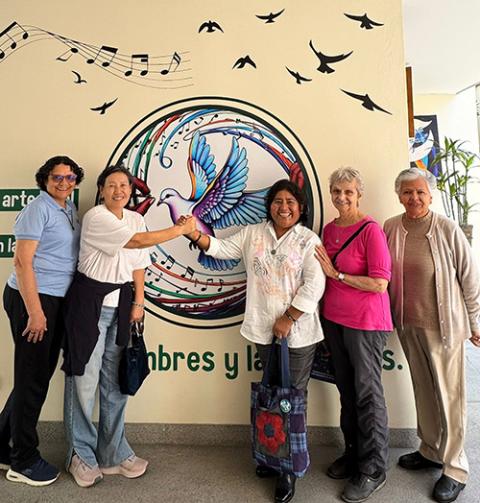
At the office of the Religious Conference of Peru, Sr. Sophia Park visits sisters collaborating against human trafficking. They all belong to different congregations. (Courtesy of Sophia Park)
One of the most remarkable things about Lima was the sense of collaboration among women. Through the Religious Conference of Peru, various religious communities in Lima work together, and one of its commissions fights against human trafficking. There are 39 congregations involved in this commission, and I had the privilege of visiting two young women from Venezuela who had been victims of human trafficking and who were now living in clean and safe shelters provided by the Daughters of Charity sisters.
Many sisters from various communities work together to support those poor women and help them return safely to their country. In this poverty-stricken city, people are ready to support one another in work and keep jubilant spirits.
The next day, I met Merly Linares, a devoted associate of the Sisters of the Holy Names of Jesus and Mary, who has accompanied women suffering from domestic violence through a ministry program that walks with them tenderly. The Peruvian government provides funds, although it is unclear whether the program will continue to receive them due to the government's financial situation.
Even with scarce resources, I sensed Gospel values overflowing among the people. There is no hierarchy, but rather just a sheer sisterhood of beautiful energy supporting one another.
The Peruvian government openly accepts people from Venezuela, and it is not difficult to find shelters that provide beds and food. As a woman religious from the United States, a country now banning poor immigrants from the Global South, I felt shame. Walking into the shelters provided by many religious communities, I sensed the richness and abundance of the Gospel among these religious women and the other women partners.
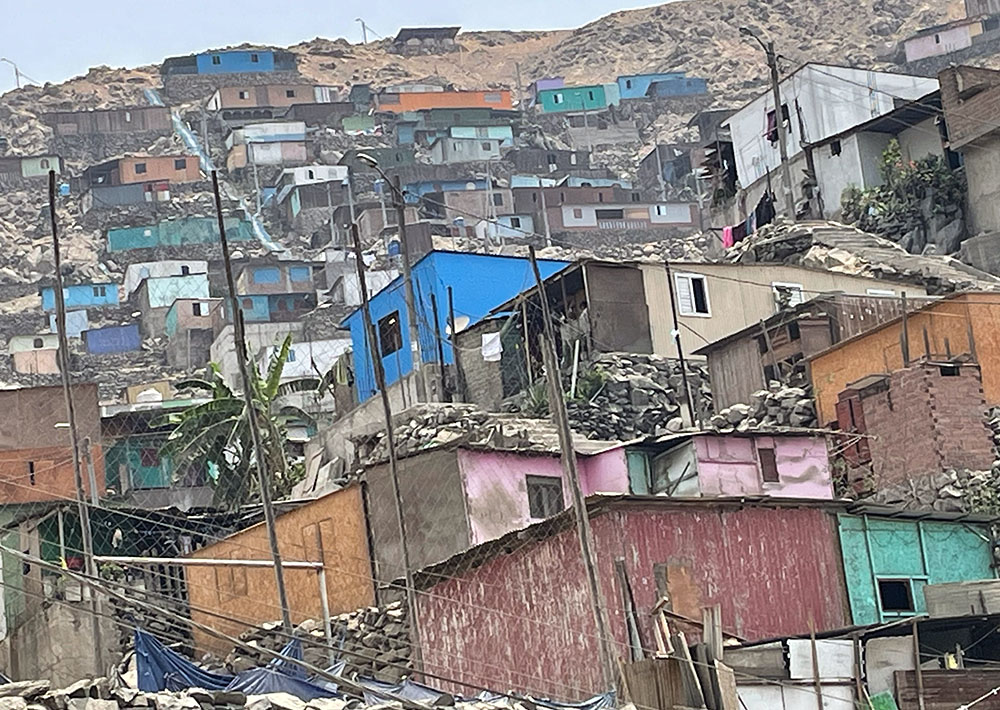
Houses along the slope in Lurigancho, Lima, Peru. There are many women leaders who work hard to serve the community. (Courtesy of Sophia Park)
At the place where I stayed in Lurigancho, Holy Names of Jesus and Mary Sr. Yenny Chipana works with wounded children in poor neighborhoods, having created a psychological counseling center in an abandoned parish building. Although conditions are poor, there is a welcoming spirit and a sincere love for the people.
On my way home, I saw the light from the hill again. However, it was no longer surreal. Under that very light, women were writing a new and fresh theology.
In a global sister spirit, I strongly desired to learn more about the spirituality and theology of liberation from these women. How do they maintain their upbeat energy, not give up amid difficulties, and love Jesus in the mission? How do we collaborate organically and naturally together?
One evening before I left Lima, I attended a memorial service for Fr. Juan Dumont Chauffour, who loved Peru deeply; there, I met many missionaries from different countries who participated in Jesus' movement to bring in people (Matthew 4:19).
After their beautiful witness of love and mission; I feel deeply that we all came from Galilee and, finally, someday, all go back there. On the way back home, leaving Peru, I found myself singing the song "Pan de Vida" by Bob Hurd and Pia Moriarty:
Pan de vida, cuerpo del Señor,
Cup of blessing, blood of Christ the Lord.
At this table, the last shall be first.
Poder es servir, porque Dios es amor.




